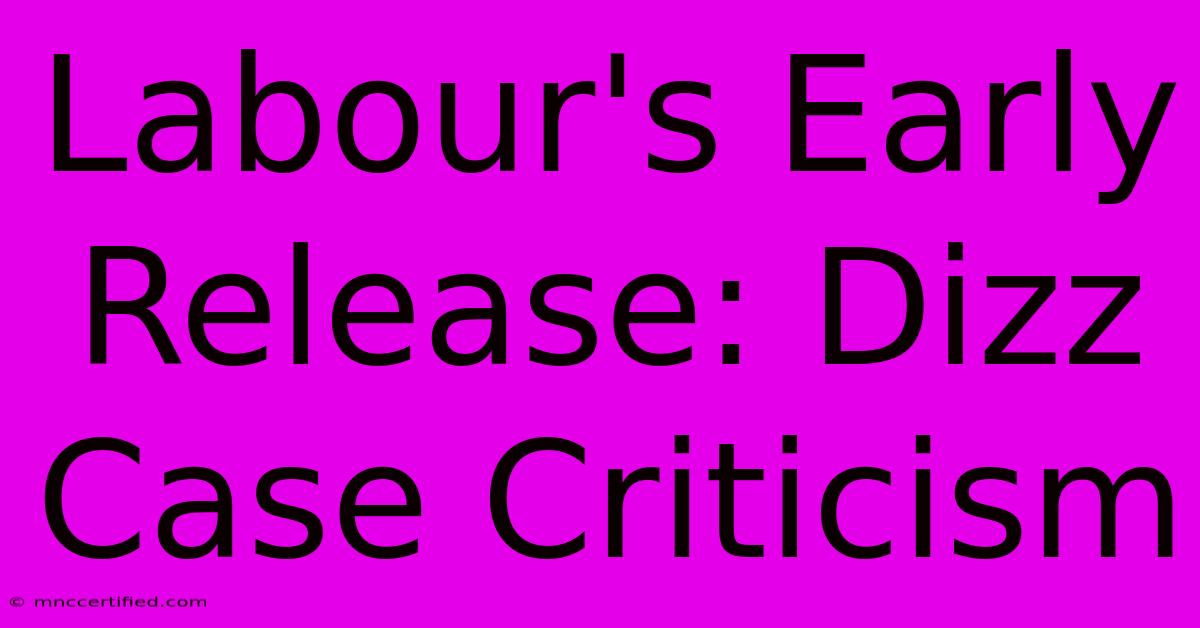Labour's Early Release: Dizz Case Criticism

Table of Contents
Labour's Early Release Policy: A Critical Analysis of the Dizz Case
The recent early release of convicted criminal, referred to here as "Dizz" to protect his identity while adhering to legal and ethical considerations, under Labour's proposed early release policy has sparked intense debate. This case serves as a potent example of the complexities and potential pitfalls of such policies, highlighting the need for careful consideration and robust safeguards. This article will delve into the specifics of the Dizz case, analyse the criticisms levelled against Labour's policy, and explore potential improvements.
The Dizz Case: A Detailed Examination
Dizz, convicted of [Insert Crime – e.g., aggravated assault, fraud], was released early under Labour's proposed scheme [Specify the scheme – e.g., "Early Release for Rehabilitation" program]. The justification for his early release centred on [State reasons given – e.g., "successful completion of rehabilitation programs," "demonstrated remorse," "positive behaviour"]. However, critics argue that these justifications were insufficient, pointing to [List specific concerns – e.g., "limited participation in rehabilitation programs," "lack of demonstrable remorse," "concerns about potential re-offending"].
The timing of Dizz's release, [Specify the timing – e.g., "just weeks before the next election," "during a period of rising crime"], further fuelled public outrage and contributed to the political controversy surrounding Labour's policy. This perception of politically motivated release has significantly damaged public trust and confidence in the government.
Key Criticisms of Labour's Early Release Policy
The Dizz case has amplified several pre-existing criticisms of Labour's early release policy:
- Insufficient risk assessment: Critics argue the assessment process is inadequate, failing to accurately predict the risk of re-offending. The Dizz case seemingly supports this, given [Explain the failure – e.g., "the parole board's decision to release Dizz despite concerns raised by the probation service," "oversight in the monitoring process"].
- Lack of transparency: The lack of transparency surrounding Dizz's release has raised serious concerns about accountability. [Elaborate on the lack of transparency – e.g., "the decision-making process was shrouded in secrecy," "limited information was made available to the public," "no detailed explanation provided"].
- Public safety concerns: The release of individuals like Dizz raises legitimate fears about public safety. Critics argue that the policy prioritizes rehabilitation over public protection, potentially putting communities at risk. [Provide further examples if necessary].
- Political motivations: The timing of Dizz's release has led to accusations of political expediency, undermining the policy's credibility.
Potential Improvements to Labour's Early Release Policy
To address the concerns raised by the Dizz case and similar instances, Labour needs to implement several crucial improvements:
- Strengthened risk assessment procedures: Implement more rigorous and comprehensive risk assessment tools, incorporating psychological evaluations, criminal history analysis, and community input.
- Increased transparency and accountability: Ensure greater transparency in the decision-making process, making information readily available to the public and establishing clear mechanisms for oversight and accountability.
- Improved rehabilitation programs: Invest in more effective rehabilitation programs with measurable outcomes, focusing on addressing the root causes of criminal behaviour.
- Enhanced community support: Provide adequate support and resources for released individuals to help them successfully reintegrate into society and reduce the likelihood of re-offending.
Conclusion: A Necessary Reconsideration
The Dizz case serves as a stark reminder of the potential dangers of poorly designed early release policies. While rehabilitation is a crucial aspect of the justice system, it must never come at the expense of public safety. Labour needs to urgently reassess its early release policy, incorporating the recommendations outlined above to ensure fairness, accountability, and most importantly, the safety of the community. Ignoring these criticisms risks further eroding public trust and undermining the credibility of the government's efforts to reform the justice system. The future success of any early release policy hinges on a commitment to transparent processes, thorough risk assessment, and robust community support.

Thank you for visiting our website wich cover about Labour's Early Release: Dizz Case Criticism. We hope the information provided has been useful to you. Feel free to contact us if you have any questions or need further assistance. See you next time and dont miss to bookmark.
Featured Posts
-
Cowboys Lamb Suffers Season Ending Injury
Dec 28, 2024
-
Cruise Ship Passenger Overboard Port Canaveral
Dec 28, 2024
-
Celtics Defeat Pacers Mixed Performance Analysis
Dec 28, 2024
-
Texas Tech Arkansas Football Live Stream Info
Dec 28, 2024
-
Saints Cbs Mourn Gregs Loss
Dec 28, 2024